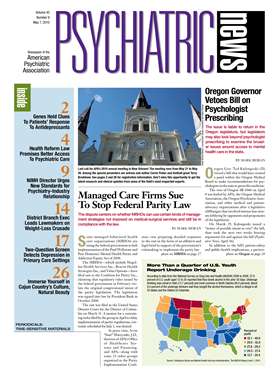Managed behavioral health care organizations, in their suit against the government's interpretation of the new parity law, are alleging that the government bypassed due process by issuing an interim final rule implementing the law.
The plaintiffs claim the government missed its own deadline of October 1, 2009, for issuing a “proposed rule for comment” and instead issued the interim final rule in February with the expectation that employers and health plans would be in compliance by July 1. The plaintiffs also claim they were denied the chance to comment on substantive issues that were included as regulations in the interim final rule (see
Managed Care Firms Sue to Stop Federal Parity Law).
“The absence of a true and complete notice and comment period resulted in confusing, flawed, and untested requirements,” the plaintiffs state in their suit.
Irvin “Sam” Muszynski, J.D., director of APA's Office of Healthcare Systems and Financing, said that the Department of Health and Human Services did issue a “request for information” (RFI) in April 2009 to which APA and many other groups—including the managed behavioral health care industry—provided voluminous documentation.
Muszynski emphasized, for instance, that Magellan Health Services submitted comments to the Department of Health and Human Services at the time of the RFI that address all of the issues the MBHOs are now citing as grievances in the interim final rule, including treatment limitations and the single deductible.
He called their complaint specious and said, “There is no new information they could have provided to the government that they didn't already provide in the request for information.”
Pamela Greenberg, M.P.P., executive director of the Association for Behavioral Health and Wellness—which represents behavioral health care organizations but is not a party to the suit—said there was nothing in the RFI about nonquantitative treatment limits (NQTLs).
“Therefore, comments submitted did not reflect concerns/implications on this topic,” she told Psychiatric News. “As a result the regulators did not have a full sense for the impact the NQTLs would have.”
But a 14-page response from Magellan Health Services to the government's RFI reveals that the company did specifically address the issue of treatment limitations, arguing that nonquantiative treatment limits were not “similar” to the limits proscribed by the parity law, and that therefore the law does not apply to them.
“The regulations should clarify that the term 'other similar limits on the scope or duration of treatment' includes only those elements of a plan design which limit the treatment in terms of time, frequency, or duration,” Magellan stated. “We do not believe it was the intent of the legislation to include, nor does the actual language support inclusion of, nonnumerical or nonquantifiable limits....”
